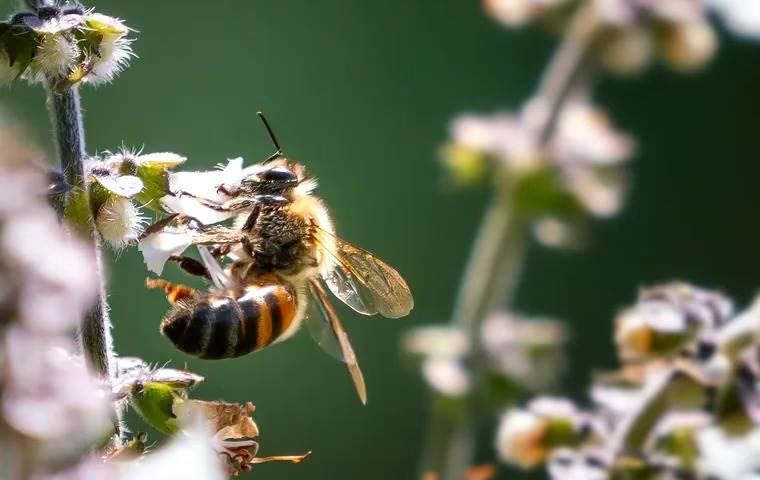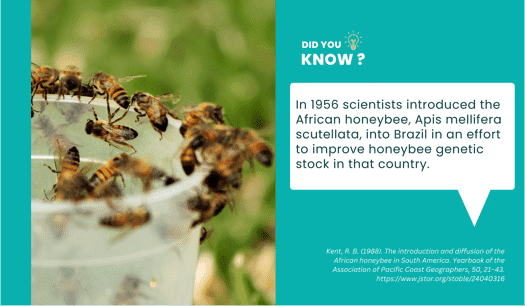What to Know About African Honey Bees in South Florida

African honey bees, also known as "killer bees," are buzzing around Florida, tougher and more chase-happy than the usual bees. Their love for Florida's warm vibe means they're here to stay, mixing things up for locals and farmers alike.
But hey, it's not all buzz and bother; they're ace pollinators, boosting our blooms. The trick? Learning to live together safely, with a dash of caution and a sprinkle of respect for our winged friends' personal space.
Key Takeaways
- Africanized honey bees, known for their aggressiveness, have spread to Florida from Africa via South America, affecting local ecosystems and agriculture.
- These honey bees are smaller, more aggressive, and swarm more frequently than European honey bees, making them difficult to distinguish and manage.
- Despite challenges for beekeeping and potential dangers to humans, these bees contribute positively to agriculture through enhanced pollination.
- Effective prevention and emergency response strategies, including bee-proofing homes and seeking professional help for bee incidents, are essential for safety and coexistence.
What Are Africanized Honey Bees?

The Africanized honey bees (AHB), sometimes called "killer bees," are a hybrid species resulting from a cross between the African honey bee and various European honey bees (EHBs).
- Origin: Africa, brought to South America by a Brazilian scientist in the 1950s
- Hybridization: Crossbreeding with European bees in Brazil
- Traits: More aggressive and less predictable than EHBs
These bees are known for their adaptability to various environments, facilitating their spread.
Africanized honey bees are known for their vigorous and sometimes aggressive colony defense and are often mistaken for regular honey bees and wasps.
Here's a comparison between Africanized honey bees and European honey bees:
Trait | Africanized Honey Bee | European Honey Bee |
Size | Slightly smaller | Larger |
Aggression | More aggressive | Less aggressive |
Swarming frequency | Higher | Lower |
Colony establishment | Rapid and in smaller spaces | More deliberate, in larger cavities |
Foraging range and habits | Wider range, more opportunistic | Shorter range, more specialized |
Impact on Florida’s Wildlife
Africanized honey bees have a significant presence in Florida, impacting local ecosystems and agriculture.
Effects on Local Wildlife and Plant Life
Introducing Africanized honey bees to Florida has changed the state's ecosystems. Notable impacts include:
- Shift in Pollination Patterns: Some native plants are now visited more frequently by these aggressive bees.
- Tight Competition for Nesting Sites: Affects local bee species and other cavity-nesting wildlife.
- Change in Biodiversity and Ecosystem Balance: Their aggressive behavior can deter pollinators from specific areas.
- Cause Concern for Humans: These bees often settle in less traditional locations, such as water meters.
Safety Measures for African Honey Bees
The rise of Africanized honeybees in Florida has necessitated a proactive approach to safety and public education.
Here are critical steps and strategies for prevention and emergency response.
Preventive Measure | Recommended Action |
Inspect Home Exteriors | Check walls, chimneys, and eaves for cracks or openings. Seal gaps where bees might enter to build honeycombs. |
Maintain Gardens | Keep yards tidy, as overgrown vegetation offers potential nesting sites. |
Secure Waste | Ensure garbage and recycling bins have tightly fitted lids. Open waste attracts bees. |
Water Sources | Cover pools and water features when not used to prevent bees from gathering for water. |
Professional Assessment | If you suspect a honey bee hive is present, contact a pest control operator or beekeeper for safe bee removal. |
Should You Seek the Bee Experts?
Encountering a swarm of bee activities can buzz you right into a dilemma: to call the bee brigade or not?
With Africanized honey bees in Florida, the stakes are a bit higher. They've earned the nickname "killer bees" for their aggressive behavior, but don't let that sway you into panic mode just yet.
When they go rogue, though, a professional pest control company (like us, Native Pest Management) intervention is the safest bet. They've got the suits, the smoke, and the savvy.
